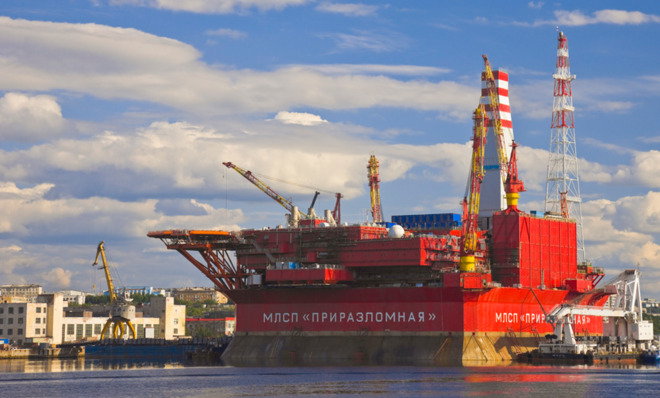The race for Arctic oil: Russia vs. U.S.
The coldest war?

A free daily email with the biggest news stories of the day – and the best features from TheWeek.com
You are now subscribed
Your newsletter sign-up was successful

The United States and Russia are at odds over a host of issues, from Ukraine to Syria to Edward Snowden, prompting talks of a new Cold War. Their next confrontation could take place on the coldest place on earth.
Last week, a Russian military official told Russian media that the Kremlin was forming a new strategic military command to protect its interests in the Arctic. It's part of a broader push from Moscow to establish military superiority at the top of the world.
"The new command will comprise the Northern Fleet, Arctic warfare brigades, air force and air defense units as well as additional administrative structures," a source in Russia's General Staff told RIA Novosti last Monday,
The Week
Escape your echo chamber. Get the facts behind the news, plus analysis from multiple perspectives.

Sign up for The Week's Free Newsletters
From our morning news briefing to a weekly Good News Newsletter, get the best of The Week delivered directly to your inbox.
From our morning news briefing to a weekly Good News Newsletter, get the best of The Week delivered directly to your inbox.
The formation of the new command follows a December 2013 order from Russian President Vladimir Putin to ramp up Russia's military presence in the Arctic. Putin said Russia was returning to the Arctic and "intensifying the development of this promising region" and that Russia needs to "have all the levers for the protection of its security and national interests."
These interests are primarily energy related. As Arctic ice has melted, companies from Canada, Denmark, Norway, Russia, and the United States — the five countries that have a border with the Arctic — have been rushing to secure rights to drill for oil and natural gas in places that are now accessible.
Hundreds of billions of dollars are at stake. Experts estimate that the Arctic holds some 30 percent of the world's natural gas supply, and 13 percent of the world's oil. That's why companies like Royal Dutch Shell, the U.S.-based Arctic Oil & Gas Corp. and Russia's Gazprom have all been making exploration claims on land in the Arctic.
Countries are making new claims in the Arctic as well. Each of the five nations with Arctic borders is allotted 200 nautical miles of land from their most northern coast. Putin's military expansion was in direct response to a claim of additional land by Canadian Foreign Minister John Baird, who last year asked scientists to craft a submission to the United Nations arguing that the North Pole belongs to Canada.
A free daily email with the biggest news stories of the day – and the best features from TheWeek.com
The Canadian claim also asserts that it owns the Lomonosov Ridge, an underwater mountain range located between Ellesmere Island, Canada's most northern border, and Russia's east Siberian coast. In 2007, Russian scientists planted a flag on the ridge to claim it as Russian territory.
Russia created the Northern Fleet-Unified Strategic Command to protect oil and gas fields on the Arctic shelf. Unfortunately for American companies, the Pentagon has fallen behind, having only two of the icebreakers necessary to navigate Arctic waters. According to the Congressional Research Service, Russia has 25, with six powered by nuclear energy.
Part of the problem is costs; a new icebreaker costs $800 million, and the Coast Guard says it doesn't need new ones. But Alaska Democratic Sen. Mark Begich said that the Obama administration should make the Arctic more of a priority.
"It's like they've never heard of it," Begich said in a recent interview with Fox News. "With the Obama administration we've had to push back pretty hard to convince them and show them why they need to invest in not only icebreakers, but forward operating bases for the Arctic."
New strategy
The Arctic hasn't been strategically important to the Pentagon since the Cold War, when missile were tested there and U.S. and Soviet submarines patrolled its waters. But DOD stopped paying attention to the region when the Iron Curtain fell.
As Arctic ice receded and the region became strategically important, DOD shifted its attention back north. Last November, it released a new Arctic strategy outlining American interests in the region.
The new strategy calls for the Pentagon to take actions to ensure that American troops could repel an attack against the homeland from a foe based in the Arctic. It's short on specifics, but calls for increased training to prepare soldiers for fights in Arctic conditions and for collaboration with other federal agencies to determine what ice patterns would look like in the future.
The document is careful to point out that the United States was willing to work with allies. However, it makes clear that the Pentagon believes the Arctic is becoming contested territory, and the DOD would act to protect American interests.
"Throughout human history, mankind has raced to discover the next frontier. And time after time, discovery was swiftly followed by conflict," the document reads. "We cannot erase this history. But we can assure that history does not repeat itself in the Arctic."
More from The Fiscal Times...
-
 What to know before filing your own taxes for the first time
What to know before filing your own taxes for the first timethe explainer Tackle this financial milestone with confidence
-
 The biggest box office flops of the 21st century
The biggest box office flops of the 21st centuryin depth Unnecessary remakes and turgid, expensive CGI-fests highlight this list of these most notorious box-office losers
-
 The 10 most infamous abductions in modern history
The 10 most infamous abductions in modern historyin depth The taking of Savannah Guthrie’s mother, Nancy, is the latest in a long string of high-profile kidnappings